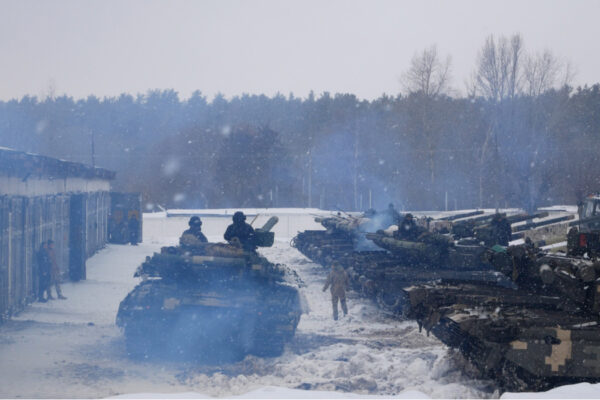Many questions remain following the unprecedented cross-border attack on Israel by Hamas militants on Oct. 7 that left more than 1,300 Israelis dead, 3,000 more injured. How did the militants plan and execute such an elaborate plan without tipping off the Israeli military? And what kind of outcomes, or what “end game,” did Hamas anticipate following these attacks?

It is important to emphasize that no one knows the exact calculations Hamas leaders made leading up to the attack. Even Iranian leaders, who have long been Hamas’ most important patron, appeared surprised by the timing and scope of attack, according to early intelligence reports. However, the attack’s timing followed a similar pattern to previous conflicts, according to David Carter, a professor of political science in Arts & Sciences at Washington University in St. Louis.
The timing of regime threats such as civil conflicts and coups d’ ́etats is the subject of a working paper by Carter and Ipek Ece Sener, a WashU PhD candidate. According to Carter and Sener, these conflicts are more likely to occur during times when regional and global power dynamics are in flux, and/or powerful states are embroiled in other ongoing crises. Previous research by Carter also found a connection between border disputes and periods of global instability.
“We argue that episodes of instability among great powers ripples through the international system and foments violent threats to rule and the escalation of civil conflict by less powerful actors,” Carter said. “During periods of systemic stability, powerful states actively maintain influence over allied political factions in states within their sphere of influence, providing financial and security assistance.
“However, during times of instability and crisis, they reduce engagement in the internal politics of less powerful states, which provides an opening for violent challenges from regime opponents.”
Instability around the world and closer to home was likely a factor in Hamas’ calculations, Carter said. For starters, Russia’s war in Ukraine has dominated the focus and resources of many global leaders for the last 18 months. Hamas leaders may have anticipated that allies would be less capable of supporting Israel, Carter explained. This is especially an issue for many NATO allies, who likely view the threat from Russia as much more salient than that from actors like Hamas.
Closer to home, Hamas likely was paying attention to the division and turmoil within Israeli politics and society — primarily related to the controversy over Prime Minister Benjamin Netanyahu’s judicial reform plan — as well as the escalating hostilities between Israeli security forces and Palestinians in the West Bank in months prior, Carter said. The escalating violence in the West Bank can be viewed as a plausible driver of this attack because it was drawing a lot of attention from the Israeli security apparatus, and it was a visible source of anger and grievance among Palestinians.
“It’s possible that Hamas thought that Israel would be less unified and less prepared to respond swiftly given their domestic concerns,” Carter said.
The most significant factor, though, was likely the historic peace deal the United States has been working to broker between Israel and Saudi Arabia over the past months, Carter said. Although not final, the deal was hailed as a “dramatic breakthrough” that would “go a long way in ending Arab-Israeli conflict and encouraging other Arab states to normalize their relations with Israel,” he said.
“This deal was arguably on par with the 1979 peace treaty between Israel and Egypt,” Carter said. “Saudi Arabia is a really significant player in the Middle East, and Hamas would be worried that a peace deal between Saudi Arabia and their rival and historic enemy would further isolate them and be harmful to the interests of their supporters in the region.”
“Spoiling that deal had to be top of mind for Hamas. At least in the short term, their attack has put that peace deal on hold,” he added.
‘Hail Mary attempt’
While the scale of the attack far exceeded what military experts believed Hamas was capable of, in the end, Hamas militants are no match for Israel’s capabilities, Carter said.
“It’s hard to see what the end game was for Hamas. These attacks feel a bit like a Hail Mary attempt,” Carter said.
According to Carter, Hamas may have been hoping to be the vanguard of a much larger, multifront conflict with Israel. But if they were banking on an uprising in the West Bank or the entrance of other actors like Hezbollah in Lebanon or Syria, that has not materialized yet.
They also may have hoped to increase their leverage with the Israeli hostages, he said.
“Perhaps that strategy coupled with an attack that was less horrific — not the widespread and brutal murdering of Israeli civilians — could have provided Hamas with some leverage. But in the context of the way this attack unfolded, it is extremely difficult for the Israeli government to negotiate with Hamas,” he said.
Neighboring countries like Egypt are pushing for restraint and some kind of negotiations, but Carter said that is unlikely.
“In the end, Israel is not going to settle for any agreement that leaves Hamas intact and in power in the Gaza Strip. And frankly, any country with the military means to eliminate a rival that had carried out an attack like this on the border would probably also be very reluctant to do so,” he said. “That being said, I view it as essential for Israel to minimize the suffering of civilians in the Gaza Strip and to respect international law with respect to human rights. Actions such as cutting off water, electricity and fuel, which greatly harms civilians, and the massive displacement of civilians with nowhere to flee to are not only awful in their own right, but will also lessen regional and global support for Israel as the conflict drags on (the European Union had already made critical statements on this issue early last week and Egypt and Saudi Arabia have both been critical as well). Thus, I view this as both a strategic and moral consideration for the Israeli government.”
While the future is unclear, based on Carter’s research, one can imagine that a long, drawn-out war between Israel and Hamas would lead to more instability in the region. Such a scenario would create opportunities for other militants to rise up, Carter said. On the other hand, a relatively quick and decisive defeat of Hamas might have a deterrent effect on other groups like Hezbollah, he said, though ground operations in such a densely populated area like Gaza are much more difficult and costly than airstrikes.


